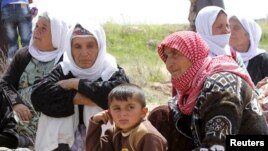03 January, 2016
The leaders of the Islamic State terror group have written a detailed memo about how female sex slaves should be treated by their IS captors.
A document was written in January 2015 but was recently uncovered by the Reuters news agency.
For example, a man who takes a woman as a sex slave cannot also have sex with her daughter, Reuters reports.

More than 200 Yazidi sect members, freed eight months after they were taken captive by Islamic State militants, wait on the edge of Kirkuk for relocation, April 8, 2015.
A translation of the original document says: "It is necessary to clarify some rules pertaining to captured prisoners to avoid any violations in dealing with them."
Apparently the rules needed to be made clear because most members of IS did not know how to treat captive women.
"These rules have not been dealt with in ages," says the first part of the document.
The New York Times wrote about the rape of a 12-year-old girl last summer. The girl was an IS captive for 11 months before escaping to a refugee camp in Iraq.
The girl said her captor would kneel down and pray before raping her. He said the rape was allowed by the Quran and brought them both closer to God.
The girl is part of the Yazidi religious minority who are being persecuted by IS.
Human Rights Watch and Amnesty International have written about the sexual abuse of Yazidi women by their IS captors.
Donatella Rovera is a crisis advisor for Amnesty International. She works with women who once were enslaved by IS.
"IS fighters are using rape as a weapon in attacks amounting to war crimes and crimes against humanity," she says.
The IS document outlines "do's and don'ts" when dealing with female sex slaves.
Here is part of the list:
- If a slave becomes pregnant, her captor cannot have sex with her again until after she gives birth.
- A man cannot cause an abortion if the slave is pregnant
- A father cannot have sex with a slave, give her to his son and then have sex with her again
- If two or more people purchase a female slave, none of them can have sex with her because she is a "joint" captive
- The owner of a female slave cannot humiliate her or force her to do work he knows she will not be able to perform.
The list has at least 15 separate points.
According to the New York Times story, IS has captured so many women that their trade has turned into a thriving business.
Women are held in warehouses, inspected like livestock and transported in fleets of buses. All sales are documented by IS-run Islamic courts.
One girl talked about how her captor considered her rape allowed by God.
An expert on Yazidi life from the University of Chicago told the New York Times that many of the IS attacks in Iraq are fueled by the desire to capture more women as sex slaves. Controlling territory is a secondary concern.
A report from the BBC in 2014 said over 3,500 Yazidi women and girls had been captured by IS.
The treatment of these captives prompted more than 100 Muslim scholars worldwide to write an open letter to IS. They condemned its practices as un-Islamic.
Two points of their letter were: "It is forbidden to deny women their rights, and it is forbidden to re-introduce slavery."
I'm Dan Friedell.
Dan Friedell wrote this story for Learning English based on reporting from the Reuters and the New York Times. Kathleen Struck was the editor.
What do you think of the way the Islamic State group treats captured women? Write to us in the Comments section or on 51VOA.COM.
_____________________________________________________________
Words in This Story
abortion – n. to end a pregnancy
fleet – n. a group of ships or vehicles that move or work together
humiliate – v. to make (someone) feel very ashamed or foolish
livestock – n. farm animals (such as cows, horses, and pigs) that are kept, raised, and used by people
memo– n. a usually brief written message from one person or department in an organization, company, etc., to another
persecute – v. to treat (someone) cruelly or unfairly especially because of race or religious or political beliefs
pertain – v. to relate to someone or something : to have a connection to a person or thing
thrive – v. to grow or develop successfully : to flourish or succeed